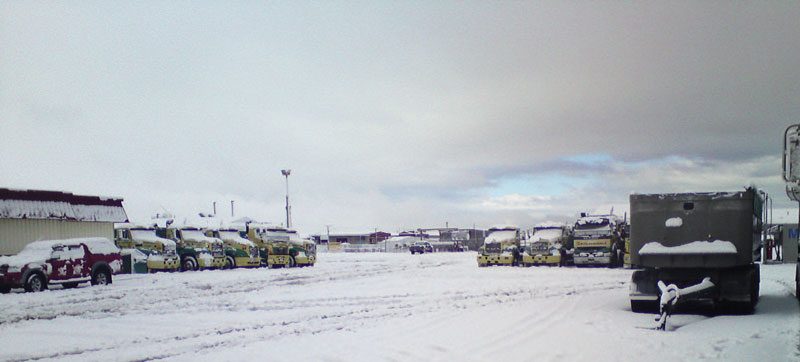
Southern Transport has its roots in the forests of Southland, if that pun is allowable. In 1946, Bill Richardson’s father Harold bought two International trucks from Jim Farrelly’s embattled Niagara Sawmilling Co, of which his own father Robert was a shareholder. R Richardson Ltd would eventually own the business outright in Harold’s time at the helm. With the purchase of those machines, Southern Transport was born.
Harold’s interest in trucks was sparked by the likes of the International and a brand-new Diamond T his father Robert bought in the early 1930s to use in the family construction business mentioned above. Transport and construction had always formed the cornerstones of Richardson enterprises. Robert’s father Samuel partnered in a coach business in Wyndham within a year of immigrating from Ireland in 1878. Robert (Harold’s father and Bill’s grandfather) was his fourth child and commenced the construction endeavours that encompassed sawmilling and logging.
For many years, Southern Transport’s cartage was centred around the family’s sawmilling and construction operations. However, a young Bill was influenced by not just the family truck and machine history but sojourns to the North Island with his father, where he saw a size and scale of equipment he’d not seen before. Following Harold’s return to work from illness in 1960, Bill told his dad that building wasn’t for him, trucks were.


In true Richardson form, Harold encouraged his son to go where his interests were, and if they bought out a local carrier to secure a general goods licence, would he stay in the family business and run the transport arm? Of course, the answer was affirmative, and so that same year, South Invercargill Transport, its four trucks and, most importantly, its vehicle authorities, were secured for £8900.
Interestingly, the famous green and cream was the brainchild of a painter who worked in the family construction business, and by all accounts, it adorned all manner of kit in the era.
It is easy to say the rest is history. But we all know what happened in the succeeding five decades, with the classic Bill Richardson three-pronged approach of organic growth, acquisition, and collaborative, mutually beneficial partnerships playing out.
The pride instilled by the Southern Transport brand and its place in the group’s wider history is quietly evident the moment you’re inside the gates at 3 Spey Street.
General manager, specialist transport, Dale Cocker has been with HW Richardson for 28 years, and Southern comes under his wing. He was manager at Freight Haulage when Bill died in 2005, and in 2007, Dale was the first person outside the family to be given full responsibility for what is essentially a division of the wider group, his role taking in all 100%-owned transport interests outside Allied Fuel, Contracting and Concrete.
He’s acutely aware of the faith extended his way, and listening to him speak clearly demonstrates his understanding of everything encompassed in the appointment. You can hear the personal weight he bore when he tells stories like the move of Southern to Spey Street.


“I guess one of my ‘claims to fame’ will be the guy that mooted the Southern move from its spiritual home in Otepuni Road to Spey Street. That was a nerve-racking conversation with Shona, I can tell you, but it made good commercial sense, and the family were fantastic about it. FHL had moved to the old Clifton Wool Scours to be closer to their work and there was increased shed capacity there for them. Southern’s work was more and more on the southwest side of the city, and we had trucks weaving through the city to get home to Otepuni Road at night, and doing the same in the morning to get out. Spey Street was an obvious place to go, and it was a purpose-built facility back in the day.”
The shift was made in September 2010 and a week later, a snow storm hit Invercargill, damaging several buildings in the city, including the old storage sheds at Otepuni Avenue. Timing as they say…
“Southern has a special place, as you’d expect. There are some amazing stats in that business. Lionel Wood is only the fourth manager it’s had since 1960, for instance.”
Today, there are 28 trucks branded in the green and cream with 11 other trucks working in the colours of Allied Materials, Joe’s Refuse Service, Heavy Haulage, Gibbs Firewood & Coal, and Clearway Skips, all brands that fall under the Southern Transport business unit. Core functions of the green-and-cream fleet include bulk cartage, log transport, construction material, machinery and waste and recycling cartage, as well as some reefer work.

“There’s a mix of brands, but we still buy Macks both here and throughout the wider group. I look at it this way; I’ve got no reason to change course from the decisions of someone who the industry regarded as a very intelligent operator in Bill. The Mack people, both here and in Australia, are great to work with. Murray Sowerby was always very supportive, and now Stu [Wynd] is there. There are a lot of other options, but none are currently any better for doing what we use the Mack product for.
“We think it’s a good place to work. There’s history and a good sense of camaraderie among the brands. We offer discount fuel, medical insurance, long service acknowledgement from five years, and there’s always plenty of scope for advancement.”
Southern Transport: as entrenched in Southland culture as a Bluff oyster, Oreti Beach, Doubtful Sound, or a hardy wind-bent tree at Slope Point. Based on gut feel, having met the team of 2022, it’s likely to be around at least as long as the others on that list, too.
Read more
Playing the Southern Anthem
0 Comments38 Minutes
Right at home
0 Comments6 Minutes
Grey Hound
0 Comments9 Minutes
Knowing your name
0 Comments6 Minutes





